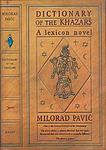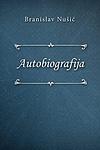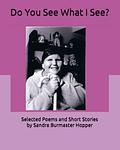The Greatest Serbian Books of All Time
Click to learn how this list is calculated.
This list represents a comprehensive and trusted collection of the greatest books. Developed through a specialized algorithm, it brings together 284 'best of' book lists to form a definitive guide to the world's most acclaimed books. For those interested in how these books are chosen, additional details can be found on the rankings page.
Genres
Countries
Date Range
Reading Statistics
Click the button below to see how many of these books you've read!
Download
If you're interested in downloading this list as a CSV file for use in a spreadsheet application, you can easily do so by clicking the button below. Please note that to ensure a manageable file size and faster download, the CSV will include details for only the first 500 books.
Download-
1. A Tomb for Boris Davidovich by Danilo Kiš
"A Tomb for Boris Davidovich" is a collection of seven short stories exploring the nature of political and personal identity, primarily in Eastern Europe during the 20th century. The stories are interconnected, each focusing on a different character who is caught up in the political turmoil of the time, often meeting tragic ends. The book is known for its exploration of totalitarianism, the nature of identity, and the power of the state over the individual.
-
2. Garden, Ashes by Danilo Kiš
"Garden, Ashes" is a semi-autobiographical novel set during World War II, tracing the experiences of a Jewish boy and his eccentric father in Hungary. The narrative weaves between the boy's vivid imagination and the harsh realities of war, as he grapples with his father's unusual behavior and the increasing threat of the Holocaust. The book is a poignant exploration of childhood, family, and the impact of war on ordinary lives.
-
3. Dictionary of the Khazars by Milorad Pavic
"Dictionary of the Khazars" is a metaphysical, historical novel written in the form of a lexicon. The book presents three different versions - Christian, Islamic, and Hebrew - of the history of the Khazars, an ancient people who converted to one of these three religions. The novel, filled with dreamlike narratives and fantastical elements, invites the reader to become an active participant, choosing their own path through the non-linear text, and even solving a murder mystery embedded within the story.
-
4. An Analysis Of The Communist System by Milovan Djilas
The book provides a critical examination of the communist system from an insider's perspective. The author, a former high-ranking official in a communist government, offers a detailed critique of the system's theoretical and practical shortcomings. He discusses the inherent contradictions between the ideology's promises of equality and the reality of a new class of bureaucratic elites that emerge to control the state apparatus. The work delves into the mechanisms of party control, the suppression of individual freedoms, and the economic inefficiencies that plagued communist states, ultimately questioning the sustainability and moral legitimacy of the system itself.
-
5. Autobiografija by Branislav Nušić
This book is a satirical account that delves into the life and times of its author, a prominent figure in Serbian literature. Through a blend of humor and irony, it explores his experiences from childhood, his education, and his varied professional endeavors, including his time in the civil service and his involvement in the theater. The narrative is marked by the author's keen observations of societal norms and the bureaucratic absurdities of his era, presenting a critical yet humorous critique of the social and political milieu of the Balkans in the late 19th and early 20th centuries. Through its engaging prose, the autobiography not only offers insights into the author's personal life but also provides a window into the cultural and historical context of the period, making it a significant work in the canon of Serbian literature.
-
6. The Tiger's Wife by Téa Obreht
"The Tiger's Wife" is a captivating novel that weaves together the lives of a young doctor and her grandfather in war-torn Balkans. As the doctor embarks on a journey to uncover the truth behind her grandfather's mysterious death, she unravels a tapestry of folklore, superstition, and family secrets. Through her exploration, she uncovers the extraordinary story of the tiger's wife, a woman believed to possess the power to communicate with animals. This beautifully written tale explores themes of love, loss, and the enduring power of storytelling.
-
7. Selected Poems by Vasko Popa
"Selected Poems" is a compilation of the most notable works by one of Serbia's most prominent poets, offering a journey through a landscape rich with folklore, myth, and personal symbolism. The collection showcases the poet's mastery of metaphor and his ability to distill complex human emotions and existential themes into concise, powerful imagery. His poetry, often characterized by a sense of mystery and a deep connection to the collective unconscious, reflects both the cultural heritage of his homeland and universal human experiences, resonating with readers across cultural boundaries. Through his unique voice, the poet invites readers to explore the depths of the human psyche and the paradoxes of life and death.
-
8. The Tiger’s Wife by Téa Obreht
"The Tiger's Wife" by Téa Obreht is a multi-generational tale that follows a young doctor named Natalia as she navigates her way through the aftermath of her grandfather's death. As she tries to unravel the mystery surrounding his final days, Natalia reflects on her childhood memories of her grandfather and the stories he told her about a tiger that haunted his village. Along the way, she uncovers dark family secrets and learns about the power of storytelling and the resilience of the human spirit. The novel explores themes of love, loss, identity, and the complexities of the human experience.
-
9. The Use Of Man by Aleksandar Tišma
This novel delves into the harrowing experiences of a group of friends from a small town in Yugoslavia as they navigate the tumultuous landscape of World War II and its aftermath. Through their intertwined lives, the narrative explores the profound impacts of war, betrayal, love, and survival. As each character endures the brutalities of the conflict and the challenging post-war realities, their stories reveal the deep scars left by war on individuals and society. The book poignantly examines the complexities of human nature and the indelible marks of history on personal and collective identities.
Reading Statistics
Click the button below to see how many of these books you've read!
Download
If you're interested in downloading this list as a CSV file for use in a spreadsheet application, you can easily do so by clicking the button below. Please note that to ensure a manageable file size and faster download, the CSV will include details for only the first 500 books.
Download







